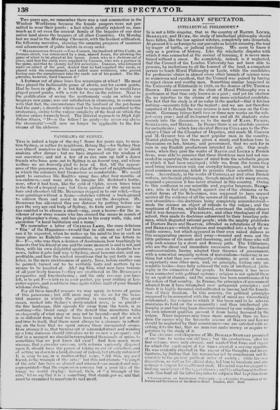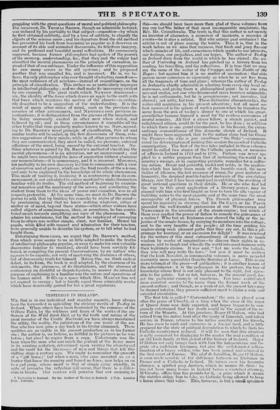INTELLECTUAL PHILOSOPHY.*
LITERARY SPECTATOR.
IT is not a little singular, that in the country of BACON', LocKE, BERKELEY, and HUMS, the study of intellectual philosophy should have fallen, like the law against witches, completely into desuetude. At present it is as foreign to our pursuits as knight-errantry, the trial by wager of battle, or judicial astrology. We seem to know it only as a portion of history. Like the scholastic disputes with which it was connected at the revival of learning, it is never men- tioned without a sneer. So completely, indeed, is it neglected, that the Council of the London University has not been able to procure, by invitations to all the learned of the land, a competent person to teach Moral Philosophy or Logic, while the candidates for professors' chairs in almost every other branch of science were so numerous and excellent, that the Council was pained by having to reject clever and worthy men. Something similar happened in the University of Edinburgh in 1820, on the demise of Dr. THOMAS BROWN. His successor in the chair of Moral Philosophy was a gentleman at that time only known as a poet ; and yet his election did no injustice to the claims of any more celebrated candidate. The fact that the study is of no value in the market—that it fetches nothing—accounts fully for the neglect ; and we are not therefore surprised at it, though the very reverse is now the case on the Con- tinent. Germany brings forth two or three new works on the sub- ject every year ; and all its learned men and all its students enter warmly into the discussions as to the merit of KANT, FICHTN:, SCHELLING, and HEGEL. In France there is an absolute passion for metaphysics ; which has elevated ROY ER COLLARD to the Pre- sident's Chair of the Chamber of Deputies, and made M. COUSIN and M. GUIZOT two of the most popular men in the country. Mental philosophy has there given a manly and fearless tone to discussions on law, history, and government, that we seek for in vain in any English productions intended for sale. Our neigh- bours, when they gave the works of BACON and LOCKE a French dress, were able to perceive that these illustrious men had not suc- ceeded in separating the science of mind from the scholastic jargon in which it had been enveloped ; while we, from the terms they used being interwoven with our everyday language, and having a good common meaning, failed to perceive their scientific inaccu- racy. Accordingly, in the works of CONDILLAC and other French writers, intellectual philosophy, though mingled with many errors, acquired a precision it has never attained in this country. Owing to this confusion in our scientific and, popular language, BERKE- LEY, who in fact only fought against one of the chimeras or es- sential forms of the Schoolmen, was supposed to have argued against all the evidence of all the senses of all mankind. His appa- rent absurdities—his doctrines being completely misunderstood— made the science an object of ridicule to the vulgar ; and the scepticism of HUME, which followed, convinced the ruling classes that it was dangerous. PRIESTLEY, and other theologians of that school, then made its doctrines subservient to their brawling pole- mics, which disgusted rational people.; while the mighty platitudes of Doctors REID and BEATTIE, intended as refutations of HUME and BERKELEY—which religious zeal magnified into a body of va- luable science, but which appeared in their own naked dulness as this exaggerating passion died away—wearied and wore out the little patience of the acute and discerning, and of all those who will only seek science by a short and flowery path. The Utilitarians, who are the direct and immediate successors of these theological controversialists, having adopted their theories of government, with a somewhat ungainly system of materialism—believing in no- thing but what they see—arrogantly claiming, in point of reason, a superiority over other men, and, on principle, writing only un- readable books—have fully achieved the ruin of intellectual philo- sophy in the estimation of the people. In Germany it has never been connected with political systems ; religion is not upheld there by an opulent church ; and the science has been countenanced by the rulers of that country. , In France, the principles of government adopted from it have triumphed over antagonist principles ; and there it is highly favoured and cultivated as having laid the founda- tion of their freedom. In this country, the political principles supposed to be connected with the study of mind are theoretically condemned ; the religion to which it has been said to be adverse maintains its hold on the community ; and thus intellectual phi- losophy is and has long been discountenanced by our ruling classes. Its own inherent qualities prevent it from being favoured by the vulgar. Nicer inquirers may trace more minutely than we have done the causes why the favourite science of BACON and Locas should be neglected by their countrymen—we are satisfied with as- cribing it to the fact, that no man can make money or acquire re- putation by the study of it. The elegance and eloquence of Mr. DITGALD STEWART promised at one time to revive our old love ; but his productions, after his
first volume, were only elegant, and wanted that force and vigour for which the excitement of the times created a craving appetite. He was evidently checked in the career of his thoughts and inves- tigations, by finding that his researches led to conclusions not fa-
vourable to the present political order of society ; while his own disposition, as well as his official duty, led him to inculcate and en- courage a respect for wealth and rank. His mind was too elegant to find an3- society out of the 1:1)i ;.T classes ; and his attachment to them made him hunt all his latter inquiries to subjects that kept him from * Conversations on Intellectual Philosophy or, a Familiar Explanation of the Nature and Operations of the Human Mind. London, Mt), Bull. grappling with the great questions of moral and political philosophy. His successor, Dr. THOMAS BROWN, though an admirable lecturer, was induced by his partiality to that subject—causation—by which he first obtained celebrity, and by a love of subtlety, to classify the objects of the science anew ; and his departure from the old method has prevented his book from becoming so popular as it deserves on account of its able and animated discussions, its felicitous imagery, and its profound and beautiful moral reflections. He erroneously supposed, because former philosophers had spoken of the powers of the memory, understanding, &c., that they and the vulgar had classified the mental phenomena on the principle of causation, in- stead of that of resemblance. Under the influence of this supposition he saw many errors in the old systems ; and he proposed another that was uncalled for, and is incorrect He is, we be- lieve, the only philosopher who ever thought of adopting causation— the most unknown of all relations—instead of resemblance, as the principle of classification. This strikes us as particularly improper in intellectual philosophy ; and we shall make its inaccuracy evident by one example. The great truth which NEWTON discovered— viz., the identity of the force which draws an apple to the earth with that force which regulates the motion of the planets—is ordina- rily described to be a suggestion of the understanding. It is the result of many other states of mind, such as the previous dis- coveries of other astronomers, and NEWTON'S own previous in- vestigations; it is distinguished from the guesses of the imagination by being necessarily excited in other men when stated, and believed by all ; and in these circumstances it resembles all the other truths that time gradually makes known to us. Now, accord- ing to Dr. BROWN'S novel principle of classification, this all and similar truths will he called, in the first discoverers of them, rela- tive suggestions of their minds; while in all other persons to whom they are communicated, they must be called, we presume, external affections of the mind, being caused by the external teacher. No thing whatever is gained by Dr. BROWN'S method of classifying the mental phenomena—it is an alteration, not an improvement ; and he might have investigated the laws of suggestion without changing our nomenclature—it is unnecessary, and it is incorrect. Moreover, his partiality to his own discovery led him to commence with a view of causation and of power, which are the final results of the science, and only to be explained by the knowledge of its whole phenomena. This mode of treating it, involving it in controversy from its com- mencement, is not calculated to entice mankind to make themselves familiar with its truths. The old method of beginning by examin- ing.- sensation and the machinery of the senses, and conducting the student from them to the ideas of power and causation, was in all respects preferable. At the same time, we must do Dr. BROWN the justice to add, that by limiting his remarks to states of the mind— by proclaiming aloud that we know nothing whatever, either of matter or of mind, beyond these states—which other writers have called objects of consciousness, ideas, or sensations, he has contri- buted much towards simplifying our view of the phenomena. We admire his conclusions, but the method he employed of conveying them to others was neither simple, clear, nor familiar. Hence his pupils, while filled with respect and admiration for their teacher, were generally unable to describe his system, or to tell what he had taught them. Entertaining these views, we regret that Dr. BROWN'S method, than which none seems to us so little adapted to make the truths
of intellectual philosophy popular, or even to make his own valuable
discoveries familiar to mankind, should have been servilely fol- lowed, in compiling the present Conversations, by an author who
appears to be capable, not only of mastering the doctrines of others, but of discovering truth for himself. Bating this, we think radical defect, in its form, the book is well adapted, by the clearness of its statements, the plainness, of its illustrations, and the absence of controversy on doubtful or disputed points, to answer its intended purpose of explaining in a familiar way the nature and operations of the human mind. It fills up a space which Mrs. MARCET has not yet aspired to occupy ; but is hardly equal those admirable works which have deservedly gained for her a great reputation.



















 Previous page
Previous page